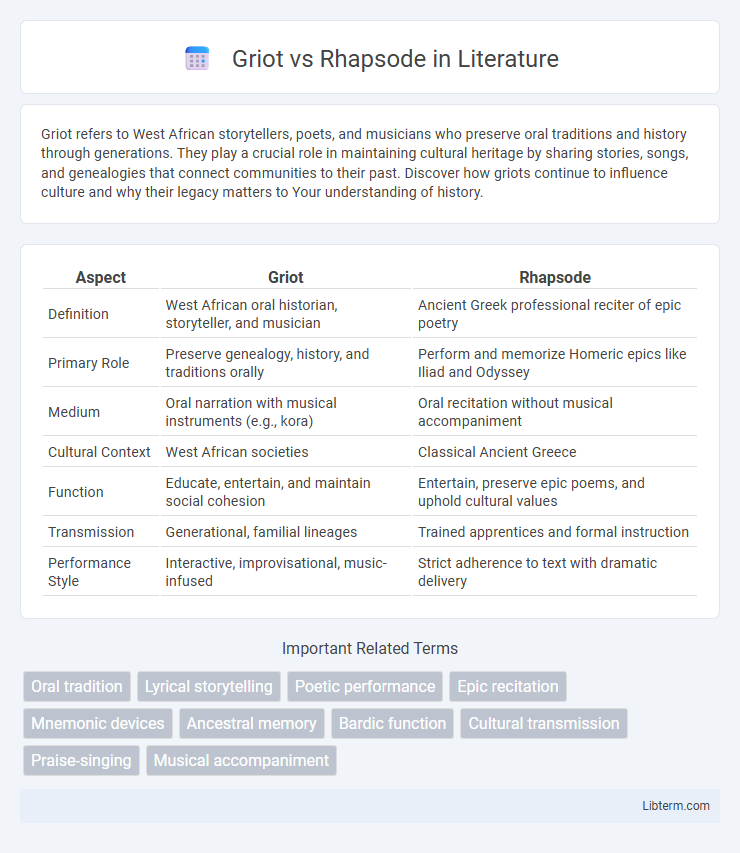Griot refers to West African storytellers, poets, and musicians who preserve oral traditions and history through generations. They play a crucial role in maintaining cultural heritage by sharing stories, songs, and genealogies that connect communities to their past. Discover how griots continue to influence culture and why their legacy matters to Your understanding of history.
Table of Comparison
| Aspect | Griot | Rhapsode |
|---|---|---|
| Definition | West African oral historian, storyteller, and musician | Ancient Greek professional reciter of epic poetry |
| Primary Role | Preserve genealogy, history, and traditions orally | Perform and memorize Homeric epics like Iliad and Odyssey |
| Medium | Oral narration with musical instruments (e.g., kora) | Oral recitation without musical accompaniment |
| Cultural Context | West African societies | Classical Ancient Greece |
| Function | Educate, entertain, and maintain social cohesion | Entertain, preserve epic poems, and uphold cultural values |
| Transmission | Generational, familial lineages | Trained apprentices and formal instruction |
| Performance Style | Interactive, improvisational, music-infused | Strict adherence to text with dramatic delivery |
Understanding the Griot: Guardians of African Oral Tradition
Griots serve as the custodians of African oral tradition, preserving history, culture, and genealogies through storytelling, praise singing, and music across generations. Unlike rhapsodes, who primarily recite epic poetry in ancient Greece, griots blend poetic narration with musical performance, creating a dynamic oral heritage integral to West African societies. Their role extends beyond storytelling to include social commentary, education, and mediation, making griots vital cultural historians and community leaders.
Who Were the Rhapsodes? Ancient Greek Storytellers Explained
Rhapsodes were ancient Greek performers known for reciting epic poetry, particularly the works of Homer like the Iliad and the Odyssey, preserving oral traditions through public performances. Unlike Griots, who combined storytelling with music and served as cultural historians in West Africa, rhapsodes focused primarily on verbal recitation and memorization of poetic texts. Their role was crucial in transmitting Greek mythology, history, and values during religious festivals and communal gatherings.
Historical Origins: Tracing Griots and Rhapsodes
Griots originate from West African cultures, serving as oral historians, praise singers, and keepers of genealogies dating back over a millennium, deeply embedded in Mande traditions. Rhapsodes emerged in ancient Greece around the 8th century BCE as professional reciters of epic poetry like Homer's Iliad and Odyssey, playing a crucial role in preserving oral literary heritage. Both figures embody the historical significance of oral storytelling but diverge geographically and culturally, with griots emphasizing communal memory and rhapsodes focusing on poetic performance.
Roles in Society: Griot vs Rhapsode
Griots serve as oral historians, poets, and musicians in West African societies, preserving genealogies, historical narratives, and cultural values through storytelling and music. Rhapsodes in ancient Greece acted as professional performers who recited epic poetry, such as Homer's works, playing a crucial role in maintaining and transmitting heroic legends and communal identity. Both roles functioned as vital cultural custodians and educators, anchoring collective memory and reinforcing societal norms through oral tradition.
Storytelling Techniques: Similarities and Differences
Griots and rhapsodes both serve as traditional storytellers, preserving cultural narratives through oral performance, yet griots primarily use musical instruments like the kora alongside their tales, while rhapsodes rely on recitation and poetry without musical accompaniment. Both employ mnemonic devices and rhythmic patterns to ensure the accurate transmission of epics and histories across generations. The griot's storytelling is community-centered, often interactive, and adaptive to audience responses, whereas rhapsodes typically perform fixed, formalized versions of epic poems in structured settings.
Language, Music, and Performance Styles
Griots use a combination of spoken word, song, and intricate rhythmic patterns on instruments like the kora to narrate history and praise individuals, blending storytelling with live musical accompaniment. Rhapsodes predominantly perform oral poetry with a focus on vocal delivery, using declamation and formulaic phrases to recite epic narratives without instrumental support. Both traditions emphasize memory and improvisation, yet griots integrate music deeply into performance while rhapsodes rely primarily on linguistic artistry and dramatic vocal techniques.
The Importance of Memory and Improvisation
Griots and rhapsodes both rely heavily on memory, with griots preserving West African oral traditions through precise recall of genealogies and historical narratives. Improvisation is crucial in griot performances, allowing adaptation of stories and music to contemporary events, whereas rhapsodes in ancient Greece primarily focused on the faithful recitation of epic poetry like Homer's works, with less emphasis on spontaneous creativity. The balance between memory and improvisation highlights the dynamic role griots play in cultural transmission compared to the more fixed oral delivery of rhapsodes.
Cultural Impact: Legacy in Modern Times
Griots have preserved West African oral traditions, influencing contemporary music, storytelling, and cultural identity through their roles as historians and musicians. Rhapsodes, ancient Greek oral poets, shaped early Western literature by transmitting epic tales like Homer's Iliad, impacting classical education and modern narrative forms. Both traditions continue to inspire cultural preservation and artistic expression in global contexts today.
Key Figures: Famous Griots and Notable Rhapsodes
Famous griots such as Mamadou Kouyate and Toumani Diabate are celebrated for preserving West African oral traditions through storytelling and music, serving as living repositories of history and culture. Notable rhapsodes include ancient Greek performers like Homer, traditionally credited with epics like the Iliad and the Odyssey, who recited long narrative poems that shaped Greek cultural identity. These key figures exemplify distinct oral performance traditions, with griots emphasizing communal memory and rhapsodes focusing on epic poetic recitations.
Preserving Oral Traditions: Challenges and Opportunities
Griots and rhapsodes both play crucial roles in preserving oral traditions, offering unique challenges and opportunities in cultural transmission. Griots, primarily found in West Africa, serve as living archives, using music, poetry, and storytelling to maintain historical narratives, though they face challenges from modernization and digital disruption. Rhapsodes, rooted in ancient Greek tradition, preserve epic poetry through performance, with opportunities for reinvention via scholarly study and contemporary theatrical adaptations that sustain their cultural relevance.
Griot Infographic

 libterm.com
libterm.com